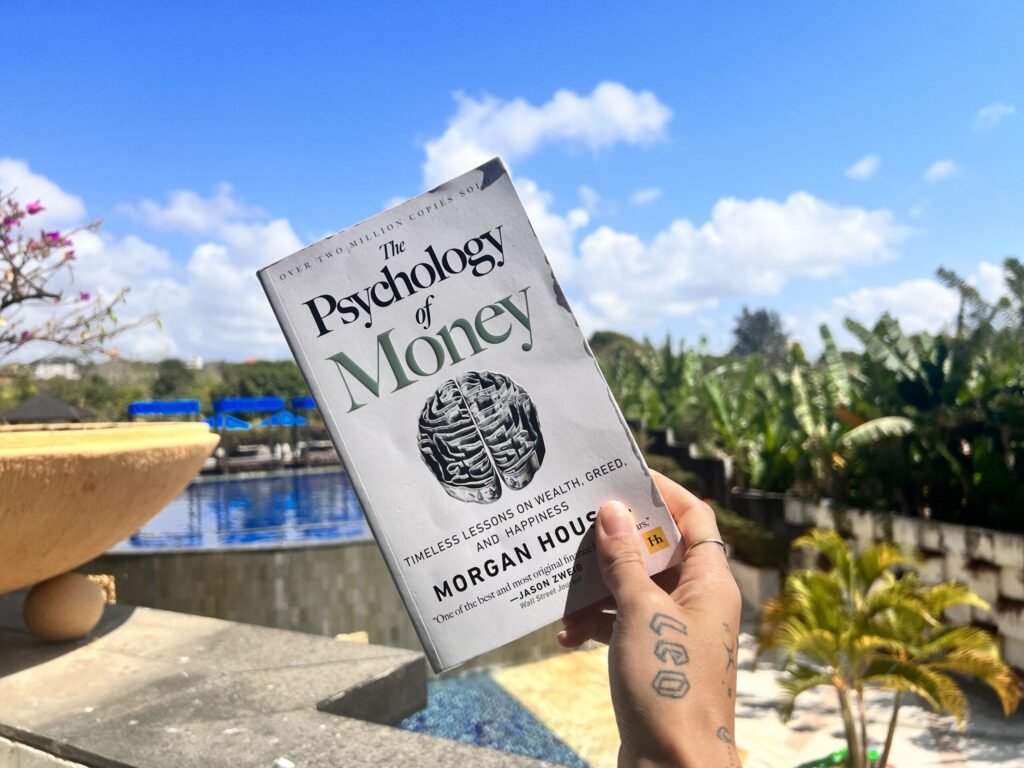The Psychology of Money – Lessons from Morgan Housel’s Book

Money influences nearly every aspect of life, from the opportunities we pursue to the security we feel. Yet many people misunderstand what leads to financial success. They assume it comes only from intelligence, advanced knowledge, or perfect strategies. In truth, success with money depends more on behavior than on technical skill.
People who save consistently, stay patient, and avoid impulsive decisions often end up wealthier than those who know complex formulas but lack discipline. This is the heart of The Psychology of Money, a book by Morgan Housel that explores how emotions, habits, and perspectives define financial outcomes.
The book has become widely respected because it avoids heavy financial jargon. Instead, it focuses on human stories and simple lessons that reveal why people succeed or fail with money. It challenges the belief that being rich requires brilliance, showing instead that calmness, humility, and long-term thinking matter more. To understand the psychology of money is to recognize how much of finance is emotional rather than mathematical.
What The Psychology of Money Teaches?
Money is not only a tool for transactions. It is tied to human hopes, fears, and experiences. Someone who grew up in poverty may save aggressively, fearing scarcity. Another who lived through high inflation may avoid holding cash. A person who watched stock market crashes may distrust investing, even when it is the best path to growth. These examples show how personal history shapes decisions.
This perspective is central to Housel’s book. He argues that no financial decision is truly crazy if you consider the person’s background. By understanding this, we can be less judgmental and more empathetic toward how others manage their money. It also reminds us to reflect on our own biases.
Knowledge can be important, but behavior determines outcomes. People with great financial knowledge often make poor choices under pressure. Fear during downturns or excitement during bubbles can undo years of planning. Housel highlights that intelligence is useful only if paired with discipline. Emotional control, patience, and consistency often deliver better results than high IQ.
Key Lessons from The Psychology of Money
Luck and Risk
Housel explains that success is never only about hard work. Luck plays a role. Risk does too. Bill Gates became successful partly because of talent, but also because of unique opportunities and timing.
Another person with equal intelligence may not achieve the same outcome because chance shaped their path differently. Recognizing the power of luck and risk encourages humility. It prevents us from overestimating our control and from unfairly judging others.
No One’s Crazy
People make decisions based on the world they know. Someone who invested during the 2008 crisis may fear markets for life. Another who grew up in a stable economy may feel comfortable taking big risks. Neither is wrong.
They are responding to their experiences. This idea challenges the view that financial choices are purely logical. Instead, they are personal and shaped by history.
Compounding and the Power of Time
One of the strongest forces in finance is compounding. Small, steady growth over long periods produces massive results. Warren Buffett is often cited as an example. His fortune comes not only from skill but from investing for decades. Many people underestimate compounding because the benefits appear slowly. Housel reminds readers that patience is often the most powerful financial tool. Trying to rush wealth usually leads to disappointment.
Defining “Enough”
The pursuit of more money can become endless. People compare themselves to others and always want a higher number. This chase often brings stress, risk, and unhappiness. Housel stresses the importance of knowing what “enough” means.
Once basic needs and reasonable goals are met, chasing endless growth does not guarantee happiness. Instead, it can lead to reckless decisions. Recognizing “enough” helps people avoid dangerous risks and live with contentment.
Saving for Security
Wealth is not only about income. It is about how much you save. Many people with high salaries remain broke because they spend everything. Savings, on the other hand, provide freedom and safety.
They allow people to handle emergencies and give them flexibility in life choices. Frugality is not about sacrifice. It is about peace of mind. Housel argues that saving is one of the most powerful habits, regardless of income level.
The Importance of Behavior in Finance

Emotions Drive Money Decisions
Markets rise and fall, but human emotions are constant. Fear makes people sell investments when prices drop. Greed makes them buy when markets are hot. Envy makes them compare their wealth with others. These emotions lead to poor decisions. Housel emphasizes that controlling emotions is more valuable than predicting markets. A calm investor often outperforms one who is constantly reacting.
Planning for Uncertainty
Life is unpredictable. Jobs can be lost. Health can decline. Markets can crash. Planning only for the best outcome is risky. Housel advises building a margin of safety into every plan. An emergency fund, insurance, and conservative investments reduce vulnerability. This flexibility ensures that setbacks do not destroy long-term progress.
Rare Events and Big Impacts
In finance, a small number of events often shape most results. A few big wins drive most investment growth. A single crisis can undo years of progress. Recognizing this helps investors stay patient. Missing one big opportunity or panicking during one big downturn can have lasting effects. Staying invested and prepared allows people to benefit when rare positive events occur.
Different Formats of The Psychology of Money
The book is available in print and digital forms. Readers can explore the lessons at their own pace, reflecting on the stories that resonate most with their lives.
PDF summaries are widely shared online. They provide a quick outline of the 18 lessons. These summaries are helpful for revision but cannot replace the depth of the full book.
The audiobook version allows readers to absorb lessons through listening. It is convenient for commutes or daily activities. Hearing the stories read aloud often makes the ideas more engaging and easier to remember.
Psychological Principles Behind Money Decisions
Loss Aversion
People dislike losses more than they enjoy gains. This makes them overly cautious or too quick to sell investments at a loss.
Overconfidence
Many people believe they can predict markets or outcomes. This leads to excessive risk-taking and disappointment.
Social Comparison
Humans naturally compare themselves to others. This creates pressure to spend or invest beyond their means.
Present Bias
Spending today feels rewarding, while saving for the future feels distant. This short-term focus often harms long-term stability.
These psychological patterns explain why people often act against their own financial interests.
Practical Applications
The lessons from The Psychology of Money are useful for everyday life.
- Define what “enough” means for you. Stop comparing with others.
- Build savings before chasing investments. Security is more valuable than risk.
- Be patient and trust compounding. Time is your greatest ally.
- Plan for setbacks. Always keep a margin of safety.
- Focus on your goals rather than external pressure.
By applying these steps, people can create financial stability and reduce stress.
Conclusion
The psychology of money shows that wealth is not just about knowledge. It is about behavior. Morgan Housel’s book reveals how emotions, luck, patience, and discipline shape financial outcomes.
By understanding these lessons, people can make better decisions and avoid common traps. Money is not only about becoming rich. It is about freedom, flexibility, and peace of mind. When behavior aligns with goals, financial life becomes more stable, fulfilling, and meaningful.
